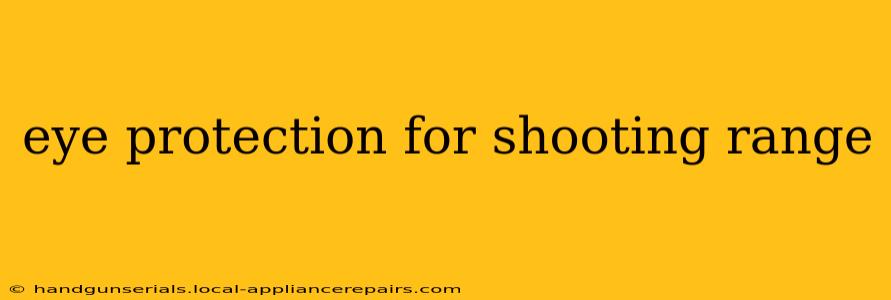Protecting your eyesight on the shooting range is paramount. A single lapse in safety can lead to permanent and debilitating eye injuries. This comprehensive guide delves into the crucial aspects of choosing, using, and maintaining appropriate eye protection for various shooting disciplines.
Understanding the Risks: Why Eye Protection is Non-Negotiable
Shooting, regardless of the firearm type or caliber, presents significant risks to your eyes. High-velocity projectiles, expelled gases, and even tiny fragments of debris can cause severe damage. These hazards aren't limited to the shooter; those nearby also require proper eye protection.
- High-velocity projectiles: Bullets, even those intended for target practice, can ricochet unpredictably, posing a threat to eyes within the shooting range.
- Expelled gases: The gases expelled from the firearm's muzzle can contain hot particles and corrosive elements that can seriously injure the eyes.
- Debris: Shattered targets, broken casings, and even small pieces of the firearm itself can become projectiles, potentially causing eye trauma.
Ignoring these risks is simply not an option. Investing in high-quality eye protection is an investment in your long-term vision and well-being.
Choosing the Right Eye Protection: Types and Features
The market offers a wide variety of shooting glasses and goggles, each with specific features designed for different shooting disciplines. Here's a breakdown of the most common types and essential features:
Types of Eye Protection:
- Shooting Glasses: Often preferred for their comfort and lightweight design, shooting glasses provide excellent protection against debris and moderate impact. They are suitable for most target shooting and hunting scenarios.
- Shooting Goggles: Offering superior protection, shooting goggles fully enclose the eyes, protecting against impacts from all angles. They're particularly crucial for high-powered firearms, competition shooting, and activities involving significant recoil.
Essential Features to Consider:
- Impact Resistance: Look for eye protection that meets ANSI Z87.1 standards or higher. This ensures the eyewear can withstand high-velocity impacts.
- UV Protection: Many shooting ranges are outdoors, and prolonged exposure to UV rays can damage your eyes. Ensure your eye protection offers 100% UV protection.
- Clear Optics: Crystal-clear lenses are vital for accurate target acquisition. Consider anti-fog coatings for improved visibility in humid conditions.
- Frame Fit and Comfort: Choose eyewear that fits comfortably and securely, preventing slippage during recoil. Consider adjustable temple arms and nose pieces for a customized fit.
- Lens Tint: Different lens tints can enhance visibility under varying light conditions. Amber lenses are often preferred for reducing glare and enhancing contrast.
Maintenance and Care of Your Eye Protection
Proper maintenance ensures your eye protection remains effective and lasts longer.
- Regular Cleaning: Clean your lenses regularly with a microfiber cloth and a lens cleaning solution specifically designed for eyewear. Avoid abrasive materials.
- Storage: Store your eyewear in a protective case to prevent scratches and damage.
- Inspection: Before each shooting session, inspect your eye protection for cracks, scratches, or other damage. Replace any damaged eyewear immediately.
Beyond the Basics: Additional Considerations
- Prescription Lenses: If you wear prescription glasses, consider shooting glasses with prescription inserts or custom-made shooting glasses.
- Hearing Protection: Always use hearing protection in conjunction with eye protection to safeguard both your hearing and vision.
- Range Rules: Familiarize yourself with and adhere strictly to the safety rules of the specific shooting range you are using.
Protecting your vision on the shooting range is not a luxury, it's a necessity. By carefully selecting, maintaining, and using appropriate eye protection, you can significantly reduce the risk of eye injury and enjoy your shooting activities safely and confidently. Remember, your eyesight is invaluable; prioritize its protection.

